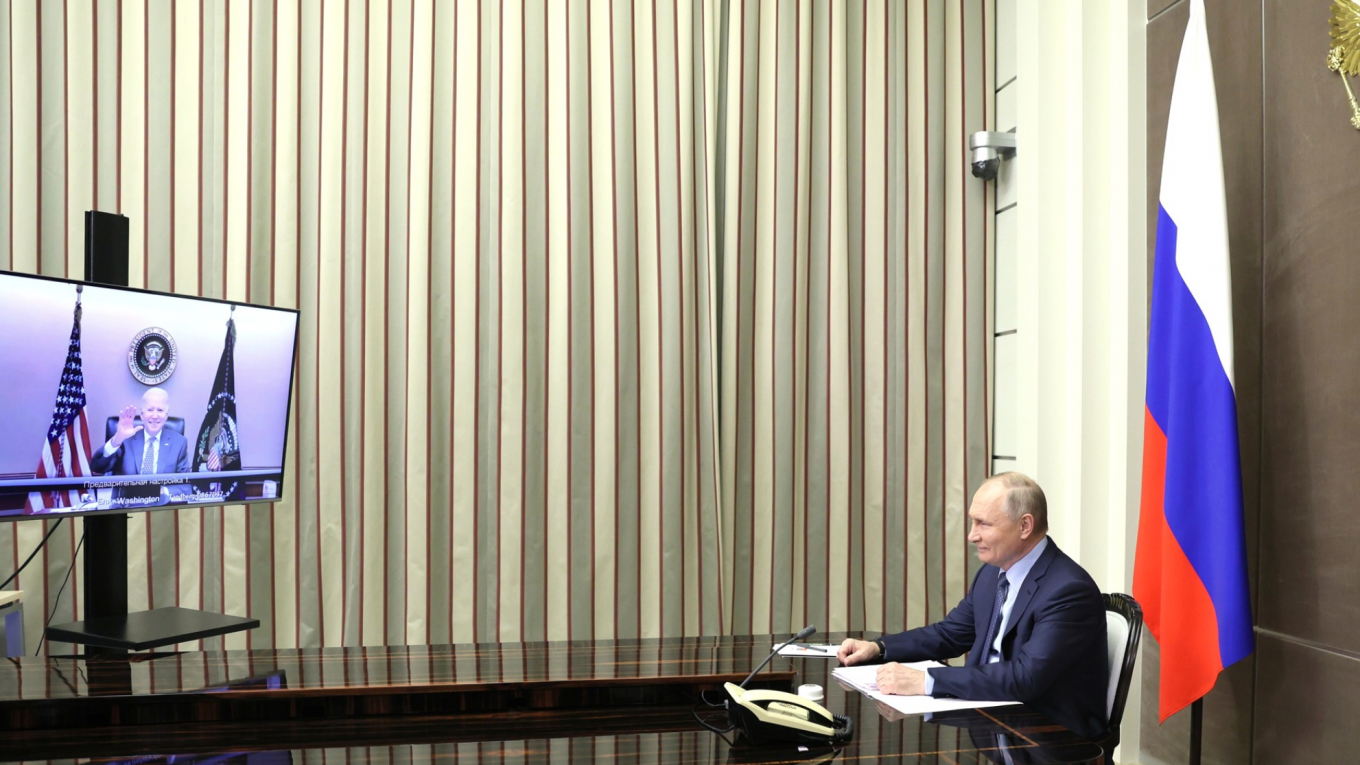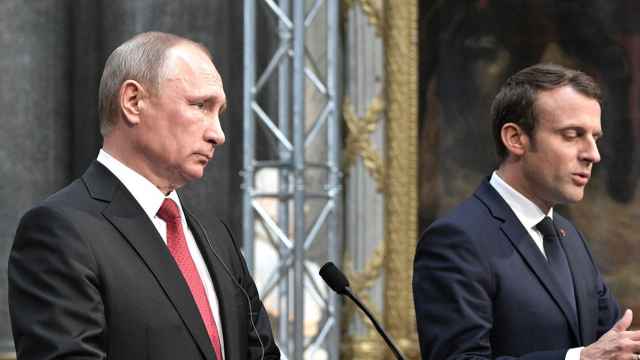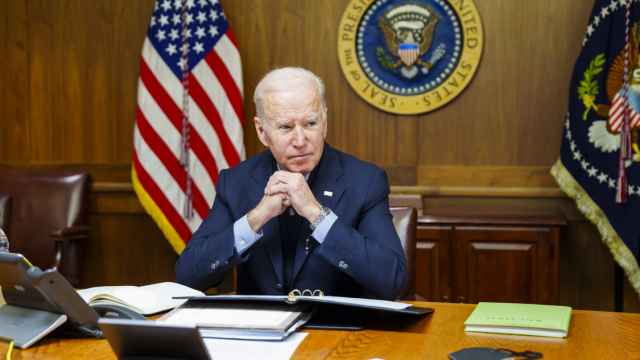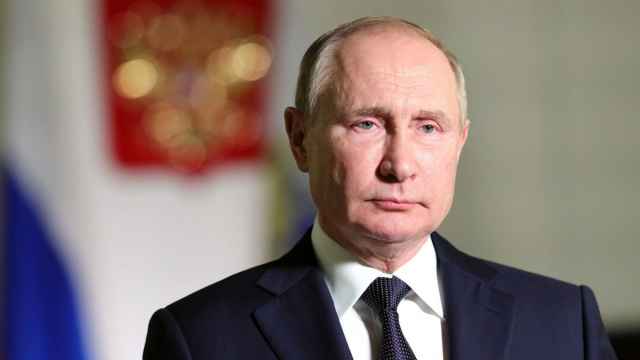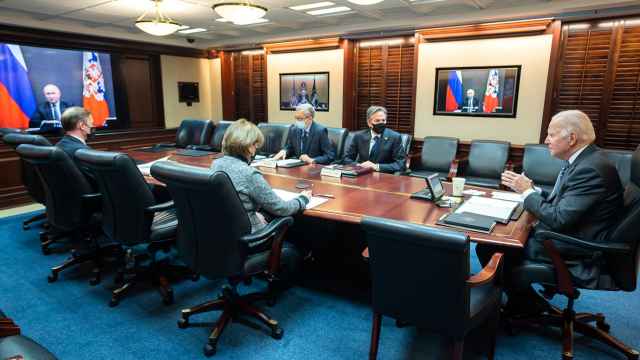Russian President Vladimir Putin and his U.S. counterpart Joe Biden held a virtual summit Tuesday in an attempt to defuse tensions on the border between Russia and Ukraine.
The behind-closed-doors talks came after weeks of rising tensions between Moscow and Washington, as a buildup of Russian troops on its border with Ukraine has sparked fears of a return to all-out hostilities between the two sides.
But although the Kremlin described the two-hour discussion as "frank and businesslike," the two leaders appear to have failed to reach a major compromise.
Biden "voiced the deep concerns" of the U.S. and its European allies toward "Russia’s escalation of forces surrounding Ukraine" and vowed "strong economic and other measures" in response to a Russian offensive, the White House said in its readout of the call.
"President Biden reiterated his support for Ukraine’s sovereignty and territorial integrity and called for de-escalation and a return to diplomacy," the White House added.
In response, Putin accused NATO of "making dangerous attempts to conquer Ukrainian territory" and "building up its military potential at our borders" and reiterated his desire for legal guarantees that NATO will not expand any further eastward.
The Kremlin said Putin described the current situation as a result of "Ukraine's internal crisis" and "lack of progress" in implementing the 2015 Minsk peace agreement.
Putin also pointed to Ukraine's so-called "destructive stance" and its "provocative actions" against the eastern Donbass region, the Kremlin readout added.
Apart from Ukraine, both the Kremlin and the White House said the two leaders discussed bilateral strategic stability plans set in place at their June summit in Geneva, efforts to fight ransomware and cybercrime and joint work on regional issues such as Iran.
The Kremlin added that the two leaders discussed the problem of their countries' "curtailed" diplomatic missions following several rounds of tit-for-tat expulsions.
"The Russian side proposed to annul all the accumulated restrictions on the functioning of diplomatic missions, which could also serve to normalize other aspects of bilateral relations," the Kremlin said.
Biden and Putin agreed that their representatives will maintain a dialogue on these issues, both sides' readouts said.
The White House said Biden called the leaders of Britain, France, Germany and Italy after the summit to follow up on coordinations between the leaders that took place Monday ahead of the Putin talks.
He will also speak with Ukrainian President Volodymyr Zelenskiy on Thursday, U.S. national security adviser Jake Sullivan said.
U.S. intelligence reportedly indicated that around 175,000 Russian soldiers have massed on the Ukrainian frontier, with a possible offensive as soon as late January.
Russia has denied the accusations of military posturing as "hysteria" and maintains it is responding to a Ukrainian buildup and NATO provocations.
"Russia has never planned to attack anyone," Kremlin spokesman Dmitry Peskov said ahead of Tuesday's talks. "But we have our own red lines."
Mosow has made clear its desire for the U.S. to guarantee that Ukraine will not join NATO, and that deepening Kiev’s informal cooperation with the Western military alliance will be halted.
Washington meanwhile has said that no country can block Ukraine's path to NATO membership.
Kiev has been locked in a bitter war with pro-Russian separatists in its eastern Donbass region since 2014, the same year Russia annexed Crimea from Ukraine. The conflict has claimed over 13,000 lives.
Biden was expected to threaten sanctions that would go far beyond those introduced in response to the annexation of Crimea, as well as boosted military support in Eastern Europe, in the event of a Russian invasion of Ukraine.
According to Bloomberg, the sanctions would include fresh restrictions on the Russian ruble, Russian sovereign debt, and on some of the country’s largest financial institutions.
The New York Times has reported that cutting off Russia from the SWIFT international payment system is also under discussion if there is an invasion.
Felix Light contributed reporting.
A Message from The Moscow Times:
Dear readers,
We are facing unprecedented challenges. Russia's Prosecutor General's Office has designated The Moscow Times as an "undesirable" organization, criminalizing our work and putting our staff at risk of prosecution. This follows our earlier unjust labeling as a "foreign agent."
These actions are direct attempts to silence independent journalism in Russia. The authorities claim our work "discredits the decisions of the Russian leadership." We see things differently: we strive to provide accurate, unbiased reporting on Russia.
We, the journalists of The Moscow Times, refuse to be silenced. But to continue our work, we need your help.
Your support, no matter how small, makes a world of difference. If you can, please support us monthly starting from just $2. It's quick to set up, and every contribution makes a significant impact.
By supporting The Moscow Times, you're defending open, independent journalism in the face of repression. Thank you for standing with us.
Remind me later.



